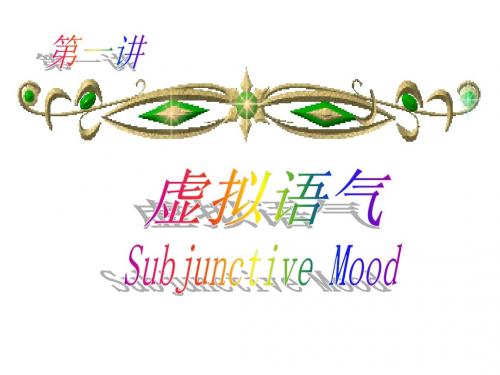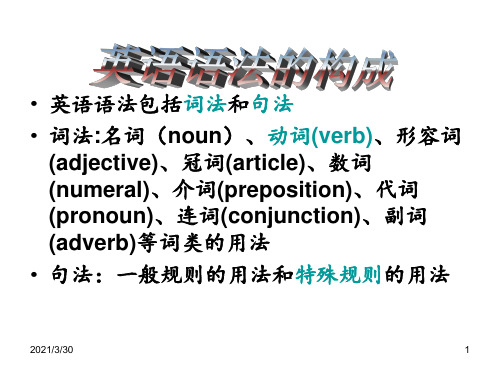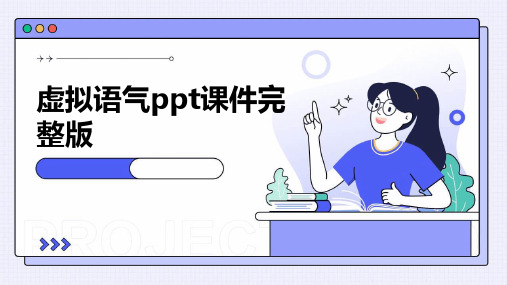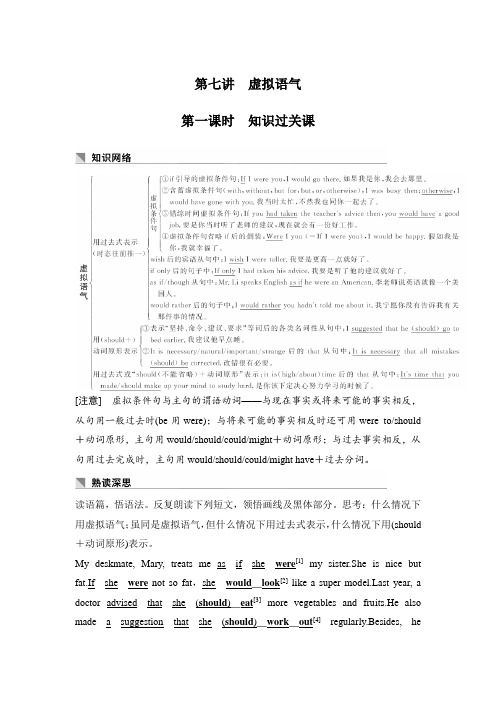第七章 虚拟语气
虚拟语气公开课全PPT课件

将来虚拟语气
总结词
表示与将来事实相反的情况
详细描述
在从句中使用一般过去时或 “were to+动词原形”,主句中 使用“would+动词原形”,表示 与将来实际情况相反的情况,常 用于表达预测、期望等情感。
混合虚拟语气
总结词
表示与过去、现在或将来事实相反的 情况
详细描述
在从句和主句中分别使用不同的时间 点的虚拟语气形式,表示与过去、现 在或将来实际情况相反的情况,常用 于表达复杂的假设、期望等情感。
在定语从句和主句中的用法
在定语从句和主句中,虚拟语气也有特定的用法。在 定语从句中,虚拟语气通常用于修饰名词或代词,表 达对某种情况的假设或想象。
例如,“I have a dream that one day this nation will rise up and live out the true meaning of its creed: 'We hold these truths to be self-evident: that all men are created equal.'”(我有一个梦想 ,有一天这个国家会站起来并实现其信条的真正含义 :我们认为这些真理是不言而喻的:所有的人生来平 等。)在主句中,虚拟语气通常用于表达对某种情况 的祝愿或假设。
02
在省略句中,虚拟语气通常出现在被省略的部分,表示与实际情况相反的情况 或结果。
03
例如,“If he had known the answer, he would have told you.”这句话省 略了“he had known the answer”的部分,只保留了关键信息“he would have told you”,表示“如果他知道了答案,他会告诉你的”。
虚拟语气公开课全PPT课件

04
虚拟语气的实际应用
在写作中的应用
写作中,虚拟语气可以用来表达假设 、条件、建议、意愿等,使句子更加 生动、有力。例如,“如果我是你, 我会选择这个选项。”
在翻译中的应用
在翻译过程中,虚拟语气可以用来保持原文的语气和情感色彩,使译文更加准确、传神。例如,在翻 译英文的虚拟语气时,可以将其翻译为中文的“要是”、“如果”、“假如”等词,以保持原文的语 气和含义。
虚拟语气在翻译中还可以用来处理一些难以理解的句子或表达方式,使其更加符合目标语言的习惯和 表达方式。例如,在翻译一些复杂的从句或长句时,可以使用虚拟语气来简化句式或突出重点。
虚拟语气公开课全ppt 课件
汇报人:可编辑
2023-12-23
目录 CONTENT
• 虚拟语气概述 • 虚拟语气的基本形式 • 虚拟语气的特殊形式 • 虚拟语气的实际应用 • 虚拟语气常见错误与纠正方法 • 虚拟语气练习与答案解析
01
虚拟语气概述
定义与特点
定义
虚拟语气是表示假设、想象、推 测等非真实情况的语气,常常用 于条件句、祝愿、建议等语境中 。
虚拟语气常见错误与纠 正方法
时态错误
总结词
时态错误是指虚拟语气在时态使用上的不准确,通常表现为混淆了虚拟语气与陈述语气 。
详细描述
在英语中,虚拟语气通常表示与事实相反的情况,如假设、想象、祝愿等,时态的使用 应与事实相反。例如,在"If I were you, I would do it"中,"were"和"would"构成了 虚拟语气,表示与事实相反的情况。如果混淆了虚拟语气和陈述语气,就会造成时态错
虚拟语气PPT课件

与过去事实相反
使用“if”引导从句,动词用“had+过 去分词”。例如:“If I had known the answer, I would have told you.”
表示祝愿、假设、想象等含义
表示祝愿
使用动词原形。例如:“May you have a wonderful day!”
表示假设
在条件状语从句中的用法
使用“if”引导从句,根据时态需要使用相应的动词形式。例 如:“If you study hard, you will pass the exam.”
在主句中的用法
根据时态需要使用相应的动词形式。例如:“If you studied hard, you would pass the exam.”
使用“if”引导从句,动词用过 去时态。例如:“If there were no gravity, we would float in
the air.”
表示想象
使用动词的过去时态或 “would+动词原形”。例如: “I imagined that I was flying
a kite.”
在条件状语从句和主句中的用法
主句谓语动词形式
主语+should/would/might/could+动词原形。
虚拟过去将来时
从句谓语动词形式
If+主语+had+过去分词。
主句谓语动词形式
主语+should/would/might/could+have+过去分词。
03 虚拟语气的用法
表示与事实相反的情况
与现在事实相反
与将来事实相反
主句谓语动词形式
主语+should/would/might/could+动词原形。
虚拟语气(公开课)

2)对将来的情况进行不真实的假设 If it snowed tomorrow, we would stay at home. 要是明天下雪,我就会呆在家里。 If I were to go to the moon one day, I could see it with my own eyes. 要是有一天,我能登上月球,我就能用我的眼睛看到 它了。 If you missed the film tonight, you would feel sorry. 要是你错过了今晚的电影,你会后悔的。
• Instructions are issued that the war prisoners be released.(同位语从句) • 释放所有战犯的命令已经下达。 • It is the committee’s decision that the meeting be put off until next Friday. (同位 语从句) • 委员会决定会议延至下星期五举行。 • It is requested that we set off at 6:30. (主语 从句) • 要求我们6点30分出发。
• 3.在形容词important, necessary, imperative, natural, urgent, essential, appropriate, desirable, vital, advisable, preferable, incredible以及短语no wonder, a pity等可以构成“It is +形容词(名词)+that” 句型中。 It is necessary that some immediate effort (should) be made. • 必须立即采取行动。
讲解最清晰最全-虚拟语气PPT课件

这种虚拟语气有两种形式,一种用于表示对现在的假设,另一种用于表示对过去或未来的假 设。例如:“If he were here, he would help us.”(如果他在这儿,他会帮助我们的。)
虚拟语气在从句中的使用
除了在条件状语从句中,虚拟语气还可以用于宾语从句、主语从句等从句中。例如:“I suggest that he go to the party.”(我建议他去参加聚会。)在这个句子中,“go to the party”是虚拟语气,表示主观愿望或建议。
PART 02
虚拟语气的形式和用法
与现在事实相反
总结词
表示与现在实际情况相反的情况。
详细描述
虚拟语气中与现在事实相反的用法通常通过将助动词“would”或“could”与动词 原形组合来实现,表示对现在情况的假设或条件。例如,“If I were you, I would try again.”(如果我是你,我会再试一次。)
语境理解错误
未能准确理解语境,导致虚拟语气 使用不当。
虚拟语气在实际中的应用
01
02
03
文学创作
在小说、诗歌等文学作品 中,虚拟语气常用于表达 作者对人物、情节的虚构 和想象。
商业沟通
在商业信函、合同等文件 中,虚拟语气常用于表示 礼貌、委婉的语气,以及 表达假设条件下的意愿。
学术论文
在学术论文中,虚拟语气 常用于描述假设情景、推 测结果等,以保持客观和 中立的语气。
与过去事实相反
总结词
表示与过去实际情况相反的情况。
详细描述
虚拟语气中与过去事实相反的用法通常通过将助动词“would have”或“could have”与动词过去分词组合来 实现,表示对过去情况的假设或条件。例如,“If I had known the answer, I would have told you.”(如果我 早知道答案,我早就告诉你了。)
虚拟语气(经典课件)

从句用过去完成时,主句用 would/should/could/might+have done。如:If you had come earlier, you would have met him.
与将来事实相反
从句用一般过去时/were to do/should do,主句用 would/should/could/might+动词原形。如:If it rained tomorrow, we would stay at home.
PART 01
虚拟语气概述
定义与特点
01
虚拟语气是一种特殊的动词形式 ,用于表示与实际情况相反的假 设、愿望、建议等。
02
虚拟语气的主要特点是通过改变 动词的形式来传达一种非真实或 假设的语气。
虚拟语气的作用
表达与事实相反的假设
通过虚拟语气,可以表达与现实情况 不符的假设条件,从而探讨可能的结 果或情况。
PART 05
虚拟语气与其他语法的综 合应用
虚拟语气与情态动词的综合应用
情态动词+have done
表示对过去事情的推测,或表达说话人的主观意愿和态度。如:Must have done表示对过去事 情的肯定推测。
情态动词+have been doing
表示对过去正在进行的动作的推测,或表达说话人的某种情绪。如:Should have been working表示本应该一直在工作。
WENKU DESIGN
WENKU DESIGN
2023-2026
ONE
KEEP VIEW
虚拟语气(经典课件)
WENKU DESIGN
WENKU DESIGN
非常详细的虚拟语气讲解资料

虚拟语气第一部分:语气的定义和种类1 语气(mood)语气是动词的一种形式,表示说话人对某一行为或事情的看法和态度。
2 语气的种类⑴、陈述语气:表示动作或状态是现实的、确定的或符合事实的,用于陈述句、疑问句和某些感叹句。
如:①There are two sides to every question.每个问题都有两个方面。
②Were you busy all day yesterday?昨天一整天你都很忙吗?③How good a teacher she is!她是多好的一位老师啊!⑵、祈使语气:表示说话人对对方的请求或命令。
如:①Never be late again!再也不要迟到了。
②Don’t forget to turn off the light.别忘了关灯。
⑶、虚拟语气:表示动作或状态不是客观存在的事实,而是说话人的主观愿望、假设或推测等。
如:①If I were a bird, I could fly in the air.如果我是一只小鸟,我就能在空中飞行。
②I wish I could pass the examination.我希望我能通过考试。
③May you succeed!祝您成功!虚拟语气在语法里算得上是个难点。
让我们就从最简单的开始吧。
第二部分:简单句中的虚拟语气一、情态动词的过去式用于现在时态时,表示说话人的谦虚、客气、有礼貌、或委婉的语气,常用于日常会话中。
如:⑴.Would you be kind enough to show me the way to the post office?请你告诉我去邮局的路好吗?⑵.It would be better for you not to stay up too late.你最好别熬夜到很晚。
二、表祝愿。
1、常用“may+动词原形”表示祝愿,但愿,此时may须置于句首(多用于正式文体中)。
⑴、May good luck be yours!祝你好运!⑵、May you be happy!祝你快乐!⑶、May you do even better!祝你取得更大成就!⑷、May you have a good time. 祝愿你玩的痛快。
虚拟语气详细讲解 ppt课件

carefully, he would not have had
(have) the car accident yesterday.
2021/3/30
11
Summary
• 虚拟语气的考点归纳如下: • (should)+动词原形的情形 • wish, if only, it is time…的用法 • if或but for等引导的条件句
2021/3/30
14
• 1)用于含有命令、建议、要求等意义的结构 中
• 含有上述意义的动词后的宾语从句
• 含有上述意义的名词后的同位语从句或表语从句
• 含有上述意义的某些It is +过去分词+that 或it is + 形容词+that 的结构中 在英国英语中,这一类的虚 拟语气也可以用should+原形动词的形式
• 倘有必要,我们随时可以援一引手。
2021/3/30
23
1.3 were型虚拟语气
• Were 型虚拟语气主要指be动词在某些表示 与事实相反的语境里使用固定的were形式
• 其他动词在类似的语境里使用过去时或过 去完成体形式的虚拟语气。
2021/3/30
24
• Were型虚拟语气主要用于表示与事实相反的愿望、 假设、印象、看法等意义的结构中
• 非简单句
• 当一个句号前出现两个、甚至更多个主谓结构时,简 单句就变成了并列句或复合句。
• ①并列句(并列连词连接) • ②复合句(从句引导词引导)
2021/3/30
7
目录
• (一)语气(虚拟语气)
• (二)情态动词
• (三)形容词、副词及比较级、最高级
• (四)代词及其指代一致
高中英语语法系列--虚拟语气讲义

虚拟语气虚拟语气表示说话人的主观愿望、猜测、建议或与事实不符的假设等,也可以表示可能性较小的情况或不可能发生的情况,而不是客观存在的事实(表示客观事实要用陈述语气)。
虚拟语气是由句中谓语动词的特殊形式表现出来的。
虚拟语气常用于复合句中,也可用于简单句。
比较:If she asks me tomorrow,I shall do it.如果她明天请求我,我会做的。
(陈述语气,说话人认为请求的可能性大)If she asked me tomorrow, I should do it. 假如她明天请求我,我会做的。
(虚拟语气,说话人认为请求的可能性小或不可能请求)1 虚拟语气的用法1-1 虚拟语气用于条件状语从句中1)表示与现在事实相反的情况If I were/was not busy today, I should go with you.如果我今天有空,我会同你一起去的。
If he were/was here,he might talk with you.如果他在这里,他可能会同你谈谈。
If I were you,I wouldn't accept her suggestion.如果我是你,我不会接受她的建议。
If I knew the answer to the question,I should/ would tell you.如果我知道问题的答案,我当然会告诉你。
If we left now, we should/would arrive there in time.如果我们现在就动身,我们会准时到达那里。
If he didn't do exercise every day,he wouldn't be so strong.如果他不每天锻炼,他不会那样强壮的。
If it weren't raining, we would go fishing.要是现在不下雨,我们就去钓鱼了。
虚拟语气公开课全PPT课件

汇报人:
2023-12-22
目
CONTENCT
录
• 虚拟语气基本概念与分类 • 现在虚拟语气详解 • 过去虚拟语气详解 • 未来虚拟语气详解 • 混合时间虚拟语气详解 • 特殊句型中虚拟语气应用 • 总结回顾与拓展延伸
01
虚拟语气基本概念与分类
定义及作用
虚拟语气定义
虚拟语气是一种特殊的动词形式,用于表示与实际情况相反或不 太可能实现的假设、愿望、建议等。
注意事项和误区提示
注意区分虚拟语气和陈 述语气的使用场景,避 免混淆。
在使用虚拟语气时,要 确保主句和从句的时态 和语气保持一致。
注意虚拟语气中动词的 变化和省略形式的使用 。
避免在不需要使用虚拟 语气的场合误用虚拟语 气,导致表达不清或语 法错误。
03
过去虚拟语气详解
结构形式
基本结构
If + 主语 + had + 过去分词,主语 + would/should/could/might + have + 过去分词
省略形式
在特定的上下文或情景中,有时可省略从句中的主语和be动词,只保留were, had, should等词。
使用场景举例
条件状语从句
表示与现在事实相反的情况或假设,如“If I were you, I would accept the offer.”(如 果我是你,我会接受这个提议。)
宾语从句
省略形式
Had + 主语 + 过去分词,主语 + would/should/could/might + have + 过去分词
倒装形式
Had + 主语 + 过去分词,倒装部分(即把if省略, 把were, had, should提到句首)
英语语法:虚拟语气ppt课件

If it had not been for your help, we couldn’t have finished the work ahead of time.
最新版整理ppt
23
5. 含蓄条件句 有时为了表达的需要,在虚拟语气中 并不总是出现if引导的条件句,而通过其他手段代替 条件句。
If only I __h_ad_n_’_t _lo_s_t___my car.
最新版整理ppt
21
3. 用介词短语代替条件状语从句。常用 的介词由with, without, but for等。
What would you do with a million dollars? =if you had a million dollars We couldn’t have finished the work ahead of time without your help.
一个坚持(insist),两个命令(order, command),三个建议( suggest, advise, propose),四个要求 ( ask,demand request, require)
最新版整理ppt
4
Revision :
1. He is not a pilot, but he wishes he _w_e_r_e__ (be).
If he had not telephoned to inform…
最新版整理ppt
24
定语从句: A man who stopped drinking water would be dead in about seven days.
虚拟语气ppt课件完整版

02 03
例子
Had you come earlier, you would have met him.(= If you had come earlier, you would have met him.)(如果你早点来,你就能 见到他了。)
例子
Should it rain tomorrow, we would stay at home.(= If it should rain tomorrow, we would stay at home.)(如果明天下雨,我们就 呆在家里。)
虚拟语气用于强调句时,通常是通过 “It was ... that”结构对句子中的特 定成分进行强调。
在这种结构中,虚拟语气的使用与普 通虚拟语气略有不同,需要根据具体 情况进行判断。
虚拟语气与其他语法结构搭配使用
虚拟语气可以与定语从句、状语从句等语法结构搭配使用,表达更为复杂的语义关 系。
在这些结构中,虚拟语气的使用需要根据具体的语境和表达的语义关系进行判断。
真实条件句
表达现实中可能实现的情况, 使用陈述语气。
例子
If you study hard, you will pass the exam.(如果你努力 学习,你会通过考试。)
非真实条件句
表达与事实相反或不太可能实 现的情况,使用虚拟语气。
例子
If I were you, I would not do that.(如果我是你,我不会那
状语从句中虚拟语气使用
在if条件状语从句中
如果条件状语从句所表示的内容与实际情况相反或实现的可能性很小,则从句中的谓语动词常用虚拟语气。
在其他状语从句中
除了if条件状语从句外,还有一些其他状语从句也可以用虚拟语气,如:in order that(为了)、so that(以便 )等引导的目的状语从句中。这些从句中的谓语动词形式通常为“may/might/could/should + 动词原形”。
虚拟语气的用法归纳总结

虚拟语气的用法归纳总结一、虚拟语气的概念和定义虚拟语气是一种特殊的语气形式,用来表示说话人对某种情况或假设的幻想、猜测、愿望、怀疑或建议等观点态度。
虚拟语气与实际情况相反或者与事实不符合,常常用于条件句、从句或动词后面,并且常伴随着助动词"would"、"could"等。
二、虚拟语气的用法1. 条件句中的虚拟语气条件句中的虚拟语气表达了与现实相反或不可能发生的假设。
其中,主句使用过去完成时(had done)来表示结果。
例如:"If I had studied harder, I would have passed the exam."(如果我学习更努力,我就能通过考试了。
)2. 虚拟条件句中的倒装结构在虚拟条件句中使用倒装结构可以突出某种假设情况或听起来更有说服力。
例如:"Had you told me earlier, I would have helped you."(如果你早点告诉我,我就会帮助你。
)3. 建议和愿望中的虚拟语气在建议和愿望中,虚拟语气常用来表达对现实不满意的愿望或希望。
例如:"I wish I were taller."(我希望我更高一些。
)"I suggest that he be more careful next time."(我建议他下次要更加小心。
)4. 怀疑、否定和推测中的虚拟语气虚拟语气在表示怀疑、否定和推测时也经常被使用。
例如:"I don't believe you would do such a thing."(我不相信你会做这种事情。
)"It is possible that she might have forgotten about the meeting."(她可能忘记了会议。
虚拟语气的构成及其用法ppt课件.pptx

if虚拟条件句 表示条件是假设的或几乎无法实现的, 谓语动词 用虚拟语气。
①与现在事实相反
②与过去事实相反
③与将来事实可能相反
与现在事实相反
If I had a great deal of money, I would buy a villa (别墅) for my parents.
与现在事实相反
The old woman’s demand is that her son (should) come to see her once a week. 那位老妇人的要求是她的儿子每周来看她一次。
We are in favor of the advice that the factory (should) be closed
down.
我们赞成关闭工厂的建议。
wish
与现在事实相反: 一般过去时( be 用were ) 与过去事实相反: 过去完成时 与将来事实相反: would/could +V.原
should
I wish I _w_e_r_e_ (be) as tall as Yao Ming.
I wish/wished I __h_a_d_n_’t(have not) eaten so much watermelon.
the future .
A had visited B would visit
C visited
D will visit
I’d rather you _D___ me the
news. A. not tell B. not to tell C. didn’t tell D. hadn’t told
I wish it _w_o__u_ld_ ( will ) rain tomorrow. If so, I can stay at home to have a good sleep.
高中英语语法讲解——虚拟语气PPT教学课件

英语中有些句子从形式上看不包 含条件从句,但在意义上却是非 真实条件句,这类句子称为含蓄 条件句,这样的句子可分为三类
高中英语语法讲解——虚拟语气(共49 张PPT)
高中英语语法讲解——虚拟语气(共49 张PPT)
1.省略整个条件句 --Such mistakes could have been avoided. (省略了if we had been more careful). 这样的错误本来是能够避免的。 --I should have caught the train. (省略了 if I had left a little earlier) 我本应该赶上火车的。
这类非真实条件句表示过去未 发生的事情,和过去事实相反。 比如:
- - If I had left a little earlier ,I would have caught the train. 如 果我早一点离开的话,我就会赶上 火车了。
--The man’s life might have been saved if he had been sent to a better hospital.
如果她听从医生建议的话,现在也就 不会住院了。
高中英语语法讲解——虚拟语气(共49 张PPT)
高中英语语法讲解——虚拟语气(共49 张PPT)
--Tom would be studying at the university now if he had passed the entrance examination.
高中英语语法讲解——虚拟语气(共49 张PPT)
这类非真实条件句表示对未来事情的虚拟推测。 --If I were to/should do it ,I would do it in a
虚拟语气的讲解

语法Unit 7—8 袁教道编辑虚拟语气是特殊的动词形式,用来表示说话人所说的话并不是事实,而是一种假设、愿望、怀疑或推测。
判断是真实条件句还是非真实条件句。
只有在非真实条件句中才使用虚拟语气。
通过句子意思,看假设的条件是否能够实现,能够实现是真实条件句,不能使用虚拟语气;假设的条件不能实现则是非真实条件句,要用虚拟语气.判断这个假设是与哪个事实相反。
最基本的虚拟语气句型:1. 虚拟现在时表示与现在事实相反的假设,其if 从句的谓语形式用动词的过去式(be 一般用were),主句用would/ should/ could/ might +动词原形。
If places were a like, there would be little need for geographers.如果各个地方都一样,就不需要地理学家了。
2. 虚拟过去时是表示与过去事实相反的假设,if 从句的谓语形式用过去完成时即had+过去分词,主句用would / should / could / might + have +过去分词。
If he had known your address yesterday, he would have telephoned you.3. 虚拟将来时是表示对将来实现的可能性很小的或不确定的假设。
If从句的谓语形式用一般过去式或用were to / should +动词原形,主句用would / should/could/ might +动词原形。
If he were to leave today, he would get there by Friday4. 省略if 采用倒装语序的条件句。
有时可以把含有助动词、情态动词、be或have的虚拟条件句中的连词if 省去,而将had , should, were 等词提到主语之前,即用倒装结构。
Had he worked harder, he would have got through the exams.Were he to leave today, he would get there by Friday.Were I in your place, I wouldn’t do that5. 有时虚拟条件句并没来if 从句表示出来,而是用介词短语(otherwise, or, without, but for)、上下文或其它方式来表示。
虚拟语气课件 PPT

1、 If I had known you were ing, I ___Dyou at the airport、
如果我就是您,我就会买这栋房子。 If I _w__er_e_(be) you, I W__o_u__ld__b_u_y_(buy) the house、
如果我能飞,我要飞到空中。 If I _co_u__ld__fl_y_(can fly), I _w__o_u_l_d_f_ly__(fly) in the sky、
如果我们再有另外7天假得话,我们都会感到跟 高兴得。 If we _h_a_d__(have) another 7-day holiday, all of us _w_o_u_l_d_b_e_(be) more happier
1、 If he ____ me tomorrow, I would let him know、
3、 If it ________ to snow next week, I would not go to visit that mountain village、 A、 is B、 be C、 were D、 are
一、if 条件句中得虚拟语气
时间
过去 现在 将来
If 条件句
had done (过去完成时)
If 条件句
had done (过去完成时)
过去式(did) be were
①did / were ②should +do ③were to do
主句
would should could might
第七讲 虚拟语气.doc

第七讲虚拟语气第一课时知识过关课[注意]虚拟条件句与主句的谓语动词——与现在事实或将来可能的事实相反,从句用一般过去时(be用were);与将来可能的事实相反时还可用were to/should +动词原形,主句用would/should/could/might+动词原形;与过去事实相反,从句用过去完成时,主句用would/should/could/might have+过去分词。
读语篇,悟语法。
反复朗读下列短文,领悟画线及黑体部分。
思考:什么情况下用虚拟语气;虽同是虚拟语气,但什么情况下用过去式表示,什么情况下用(should +动词原形)表示。
My deskmate, Mary, treats me as__if__she__were[1]my sister.She is nice but fat.If__she__were not so fat,she__would__look[2]like a super st year, a doctor advised__that__she__(should)__eat[3]more vegetables and fruits.He also made a__suggestion__that__she__(should)__work__out[4]regularly.Besides, heinsisted__that__she__(should)__walk[5]to school.If__she__had__followed__the doctor’s advice, she__would__not__be__so__fat__now[6].In other words, if__the__doctor__had__persuaded her to do so, she would__not__have__become[7] overweight.This morning, Mary’s mother bought her a new dress.It was really nice.But after she tried it on, she couldn’t help shouting, “If__only__I__were[8] a little thinner!__How__I__wish__I__had n’t__eaten[9]so much junk food before!”Were__I__Mary,__I would__make[10] a weight loss plan.If__I__became__overweight in__the__future,I__would__do[11]sports every day.Now it__is__high__time she__changed[12]her lifestyle.Without a healthy lifestyle, she wouldn’t__be[13]able to lose weight.I would__rather__she__went[14] swimming with me, but she insists__that water__sports__are[15]not suitable for her.So it__is__necessary__that__she (should)__walk[16] to school.1.在as if/as though,even if/even though引导的状语从句或表语从句中,与现在事实相反时,从句的谓语动词用一般过去时;与过去事实相反时,从句的谓语动词用过去完成时。
- 1、下载文档前请自行甄别文档内容的完整性,平台不提供额外的编辑、内容补充、找答案等附加服务。
- 2、"仅部分预览"的文档,不可在线预览部分如存在完整性等问题,可反馈申请退款(可完整预览的文档不适用该条件!)。
- 3、如文档侵犯您的权益,请联系客服反馈,我们会尽快为您处理(人工客服工作时间:9:00-18:30)。
第七章虚拟语气虚拟语气是用来表示主观愿望和假想的虚拟情况,又称为Thought Mood。
§7.1 虚拟语气在非真实条件句中的应用1.在非真实条件句中虚拟语气的一般表示方法非真实条件句可能指的是过去、现在和将来的情况。
不管它指的是什么时间,它总是表示与事实相反的一种设想,可以分为三种情况:(1)与现在情况相反。
在条件句中用过去时,be 动词用were,在主句中用would/should+动词原形。
a.If I were you,I would go there.b.If he came with us,we should feel much better.(2)与将来情况相反。
在条件句中用should+动词原形,或用wereto+动词原形或用过去时,在主句中用should/would+动词原形。
a.If the sun should cease to give heat,the air would slowly cool off.b.If I were to see my wife who died a few years ago,I would tell her what a life we areliving now.c.If we missed the train,we should have to wait an hour at the sta-tion.d.If the sea rose 500 feet some day,India would become an Island.在条件句中,should+动词原形、过去时和were to+动词原形三种形式都可以表示虚拟语气,但在虚拟程度上不同。
a.If it should rain tomorrow,we would not go.b.If it rained tomorrow,we would not go.c.If It were to rain tomorrow,we would not go.上面三个例句中条件句的虚拟程度,即“下雨”的不可能性依次加重。
( 3 )与过去情况相反。
条件句中用过去完成时,主句中用should/would+have+过去分词的形式。
a.I should have died of hunger if the Communist Party had not come in 1949.b.If I had time yesterday,I would have repaired the pump.c.If you had asked me,I would have told you the whole story.d.If I had met him,I would have spoken to him.2.虚拟语气应用中应该注意的几个问题(1)在主句中,我们可用could,might 来取代should 和would。
a.If I had another 500 yuan,I could buy a car.b.If you asked me nicely,I might take you out to dinner.c.If my parents had been rich,I could have gone to university.d.If the illness had been diagnosed earlier,it might havemade all dif- ference.(2)混合虚拟语气。
当条件句和主句所指的时间不一致时,就需要根据不同的要求,用不同的动词形式来表达。
a.If he had followed the doctor's advice at that time,he would be quite all right now.b.If you were to escape to the U.S.tomorrow,I would beat you to death this evening.c.If you hadn't made adequate preparations by now,we wouldn't dare to start the projectnext week.(3)不带if 的倒装句。
在文学作品中,如果条件从句中有were,had,should 等词时,常用不带“if”的主谓倒装句来作条件句。
a.Had he time(=If he had time),he would help us to solve these problems.b.Were there no sun(=If there were no sun),there would be no life at all.c.Should you change your mind(=If you should change your mind),no one would blameyou.d.Should there be a flood(=If there should be a flood),what should we do?(4)不用if 的各种条件句。
有时,我们用其他手段表示真实或非真实的条件句,常用的有:①用介词短语a.Without steel,there would be no industry.b.Under another social system,such floods would have caused terri-ble disasters.②用动词不定式短语a.It would be a mistake not to help him.b .To hear him speak English one would take him for anEnglishman.③用动名词短语a.Reading without thorough comprehension wouldn't do you much good.b.It would be a fine thing indeed not knowing what time it was in the morning.④用but for/but thata.But for the thick tree,the bitter wind would blow the house to pieces.(=If it were notfor the thick tree,?)b.But for the rains,we should have had a pleased journey.(=If it had not been for the rains,?)c.But that I saw it,I could not have believed it.(=If I had not seen it,?)d.She would have fallen but that I caught her.(=?if I had not caught her.)but for,but that 意为“若不是?”。
其实,象下面这样的句子,也可以认为是省掉“if”的条件句。
e.I had no time that day,otherwise I should have read it.(= If I had time that day,I should have read it.)f.Anyone who had been in your position would have done thesame.(=Anyone,if he had been in your position,he would havedone the same.)(5)含蓄结果句和含蓄条件句。
有时在虚拟语气中,只有表示假设愿望的条件句,根本不出现主句,但主句的意思可以推测出来。
a.If only I knew!(I should be satisfied.)b.If only I hadn't lost it.(It would be better.)与上情况相反,有时只有表示结果的主句,而把条件句省掉,但条件句的意思可以推测出来。
c.Such mistakes could have been avoided.(=If we had been more careful,such?)d.You might stay here for ever.(=If you wish,you?)e.That would be fine.(=If you should do it,that?)§7.2 从句中的虚拟语气当从句中含有表示愿望、建议和要求等含义时,一般用虚拟语气。
1.宾语从句当that 从句作下列动词的宾语时,在that 从句中要用虚拟语气,这些动词是:suggest,propose,advise,recommend,vote(建议),move(提议),intend,insist,demand,require,request,desire,ask,urge,advocate,order,command,appoint(=order 命令),direct,instruct,decree,e njoin(命令),ordain(规定),stipulate(规定),arrange,prescribe (规定),prefer,decide,resolve 决心),determine 等。
a.I vote that we(should)visit the Museum of the Chinese Revolution.b.They demanded that the aggressor troops(should)be withdrawn immediately.c.He asks that he(should)be given an opportunity to try his method.①在英国英语中,should 可有可无。
在美国英语中,特别是在正式的笔语中要求省去should。
②desire,intend,insist,determine,ordain,urge 等后面的宾语从句中,如果主语是第二人称或第三人称,谓语动词还可以用shall加动词原形。
a.I desire that you shall be there too.b.I intend that he shall set out at once.c.The law ordains that murderers shall be hanged.③suggest 意为“指出、表明”时,其后宾语从句中谓语必须用陈述语气。
